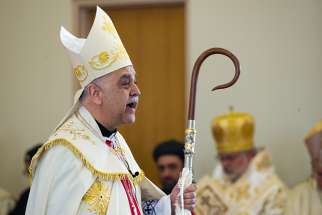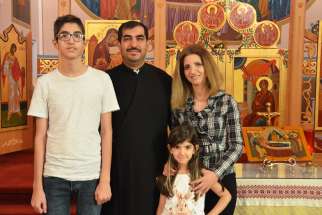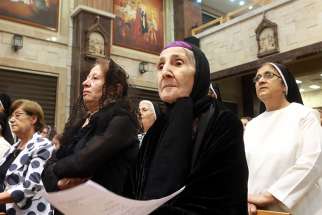November 29, 2017
Bishop Biwai Soro welcomed as head of Canada’s Chaldean Catholics
Canada’s newest bishop has taken his seat at the Good Shepherd Chaldean Cathedral in Toronto and declared his dream for Canada’s Iraqi Catholics.
Published in
Canada
October 12, 2017
Syrian priest builds new life away from war zone
EDMONTON – Fr. Issa Maamar knows how it feels to sing the Ave Maria in Damascus while rockets are blowing up your children’s schools and your hometown.
Published in
Features
MOSUL, IRAQ – Last week 300 women visited a historic monastery near Mosul after its liberation from the Islamic State – a decision their priest said was made in order to show they aren't afraid, and that Christians in Iraq are there to stay.
“We decided to go to San Behnam and Sara monastery because a lot of Christian people are afraid to go to this place, because it is sometimes dangerous,” Fr. Roni Momika said on Oct. 6, after returning from the visit.
He said the group wanted to go to the monastery “to pray and to tell the world that we are here and we will pray for peace, and we will pray for the soldiers, and we will pray for Christians in all the world.”
“Our message to give is for all people,” he said, “and our message is we want to put the name of the Father and the Son and the Holy Spirit out loud and to tell the people we are here.”
Fr. Momika is a Syriac Catholic priest from Bakhdida, also known as Qaraqosh. As a seminarian he was forced to flee when Islamic State militants attacked the city, 21 miles southeast of Mosul, in 2014. After completing his studies in Lebanon, Momika returned to Iraq and was ordained in a refugee camp in Ankawa, the Christian suburb of Erbil, the capital of Iraqi Kurdistan.
He served women and youth in the camp, which held some 5,000 families, for over a year and a half as the battle to overthrow Islamic State carried on. However, he returned to Bakhdida two months ago after it was re-captured by the Iraqi army.
Some 2,000 families joined him in returning to their hometown, which had formerly been referred to as the “Christian capital” of Iraq. The other 3,000-some families have stayed either in Erbil or surrounding villages.
Since returning to Bakhdida, Fr. Momika has taken charge of St. John the Baptist parish and has continued to lead his women's group with another priest, which is held every Wednesday at his parish.
In his comments to CNA, Momika said his was the first group to go to Mar Behnam Monastery since it was regained from the Islamic State, and “we were so happy.”
“As you know we were displaced people, refugees, but now we have come back to Qaraqosh after the liberation,” he said, explaining that he and his fellow priest, Fr. Younan, offer the women something different every week, ranging from lectures to reflections on scripture.
However, this week they decided to make the 20-minute drive and take the women to the monastery, about 23 miles southeast of Mosul, which dates to the 4th century and is home to Saints Behnam and Sara, a brother and sister killed by their father after converting to Christianity.
Built by Assyrian King Senchareb as a penance for killing his son and daughter, the monastery is one of the oldest in Iraq. Although it has changed hands several times throughout history, the Syriac Catholic Church has consistently been in charge of the monastery since 1839.
When the Islamic State unleashed its offensive on the Nineveh Plains in 2014 they bombed parts of the monastery, destroying the tombs of the saints. However, since its liberation monks have moved back in and are working to restore the areas that have either been burned or bombed.
During their visit, Momika said he and the women “and we had a special time. It was a good idea to take all these women to this monastery because we have a special memory with this monastery, because it's our monastery.”
The monastery has not yet been blessed after the destruction, since efforts to rebuild are still preliminary, he said, but the Church “is good for prayer.”
Many people have returned to Bakhdida and are trying as much as possible to live life as normal while rebuilding their city, Momika said, but noted that there are many others who can't come back yet “because their house is not rebuilt, or it's burned or destroyed.”
Currently Syriac Catholic Church leaders in the area are working hard to rebuild the houses that were destroyed with the help of several charitable organizations, including Aid to the Church in Need, SOS and the Catholic Near East Welfare Association. But funding is a problem, he said, since there is so much that needs to be rebuilt.
However, despite the challenges that face them, including the possibility of fresh conflict as a result of the recent Kurdish referendum, which voted nearly unanimously for an independent Kurdistan separate from the Iraqi central government, Momika said the people want to stay.
“For us in Qaraqosh, it's because it's the center of Christianity in Iraq and it's the center of the Syriac-Catholic Church in Iraq. I think this is why so many came back to Qaraqosh.”
In its position on the Nineveh Plain, Bakhdida sits between the Kurdish and central governments, “and I think this is the bigger problem for us,” he said, but noted that at the moment “we are living here in peace.”
“I think our God will save us, not the soldiers or anyone else,” he said, explaining that he personally chose to come back “because this is my place and it's liberated and it's my history, it's my family place and it's my own place...I won't stay in another place that's not my place.”
“We decided to go to San Behnam and Sara monastery because a lot of Christian people are afraid to go to this place, because it is sometimes dangerous,” Fr. Roni Momika said on Oct. 6, after returning from the visit.
He said the group wanted to go to the monastery “to pray and to tell the world that we are here and we will pray for peace, and we will pray for the soldiers, and we will pray for Christians in all the world.”
“Our message to give is for all people,” he said, “and our message is we want to put the name of the Father and the Son and the Holy Spirit out loud and to tell the people we are here.”
Fr. Momika is a Syriac Catholic priest from Bakhdida, also known as Qaraqosh. As a seminarian he was forced to flee when Islamic State militants attacked the city, 21 miles southeast of Mosul, in 2014. After completing his studies in Lebanon, Momika returned to Iraq and was ordained in a refugee camp in Ankawa, the Christian suburb of Erbil, the capital of Iraqi Kurdistan.
He served women and youth in the camp, which held some 5,000 families, for over a year and a half as the battle to overthrow Islamic State carried on. However, he returned to Bakhdida two months ago after it was re-captured by the Iraqi army.
Some 2,000 families joined him in returning to their hometown, which had formerly been referred to as the “Christian capital” of Iraq. The other 3,000-some families have stayed either in Erbil or surrounding villages.
Since returning to Bakhdida, Fr. Momika has taken charge of St. John the Baptist parish and has continued to lead his women's group with another priest, which is held every Wednesday at his parish.
In his comments to CNA, Momika said his was the first group to go to Mar Behnam Monastery since it was regained from the Islamic State, and “we were so happy.”
“As you know we were displaced people, refugees, but now we have come back to Qaraqosh after the liberation,” he said, explaining that he and his fellow priest, Fr. Younan, offer the women something different every week, ranging from lectures to reflections on scripture.
However, this week they decided to make the 20-minute drive and take the women to the monastery, about 23 miles southeast of Mosul, which dates to the 4th century and is home to Saints Behnam and Sara, a brother and sister killed by their father after converting to Christianity.
Built by Assyrian King Senchareb as a penance for killing his son and daughter, the monastery is one of the oldest in Iraq. Although it has changed hands several times throughout history, the Syriac Catholic Church has consistently been in charge of the monastery since 1839.
When the Islamic State unleashed its offensive on the Nineveh Plains in 2014 they bombed parts of the monastery, destroying the tombs of the saints. However, since its liberation monks have moved back in and are working to restore the areas that have either been burned or bombed.
During their visit, Momika said he and the women “and we had a special time. It was a good idea to take all these women to this monastery because we have a special memory with this monastery, because it's our monastery.”
The monastery has not yet been blessed after the destruction, since efforts to rebuild are still preliminary, he said, but the Church “is good for prayer.”
Many people have returned to Bakhdida and are trying as much as possible to live life as normal while rebuilding their city, Momika said, but noted that there are many others who can't come back yet “because their house is not rebuilt, or it's burned or destroyed.”
Currently Syriac Catholic Church leaders in the area are working hard to rebuild the houses that were destroyed with the help of several charitable organizations, including Aid to the Church in Need, SOS and the Catholic Near East Welfare Association. But funding is a problem, he said, since there is so much that needs to be rebuilt.
However, despite the challenges that face them, including the possibility of fresh conflict as a result of the recent Kurdish referendum, which voted nearly unanimously for an independent Kurdistan separate from the Iraqi central government, Momika said the people want to stay.
“For us in Qaraqosh, it's because it's the center of Christianity in Iraq and it's the center of the Syriac-Catholic Church in Iraq. I think this is why so many came back to Qaraqosh.”
In its position on the Nineveh Plain, Bakhdida sits between the Kurdish and central governments, “and I think this is the bigger problem for us,” he said, but noted that at the moment “we are living here in peace.”
“I think our God will save us, not the soldiers or anyone else,” he said, explaining that he personally chose to come back “because this is my place and it's liberated and it's my history, it's my family place and it's my own place...I won't stay in another place that's not my place.”
Published in
International




